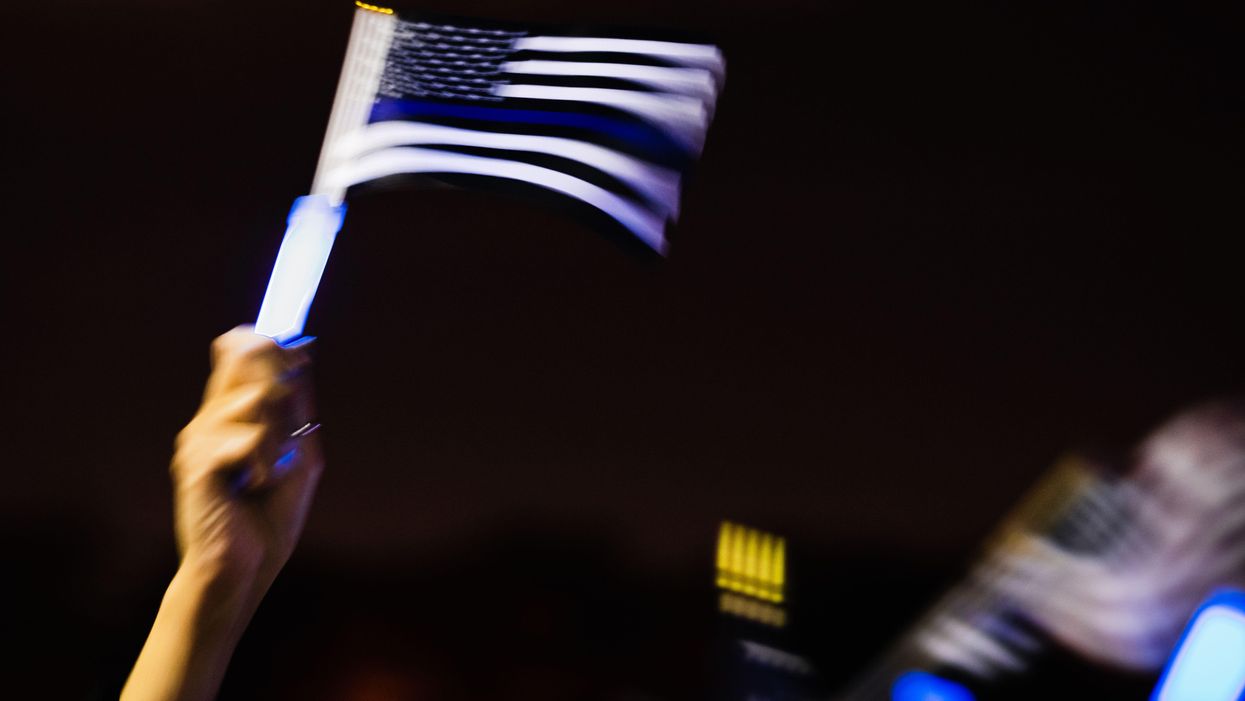
Photo by JUSTIN HAMEL/AFP via Getty Images

Oh boy
The University of Wisconsin-Madison's police chief has banned the force's officers from using the "Thin Blue Line" imagery while on duty, according to a report from ABC News.
In December, the department came under fire after an innocuous social media photo from the department featured a Thin Blue Line flag on one of the departments walls.
Social media users branded the photo "toxic" and said that the flag is a "sign of racism and conservatism."
Despite the outcry, Chief Kristen Roman at the time stuck by the flag and its presence in the office.
"The 'thin blue line' phrase and associated imagery date back decades," she said in a December statement. "To many within and outside of the police procession, it symbolized a commitment to public service and the countless selfless sacrifices willingly made to honor that commitment, up to and including laying down one's life to protect the lives of others."
The Wisconsin State Journal reported that some people associate the flag with the riot that took place at the U.S. Capitol in early January.
"Some see the controversial flag as a symbol of solidarity with police," the outlet's Emily Hamer writes, "but it has also been flown by white supremacists, including those who stormed the U.S. Capitol Jan. 6 in an attempt to overturn the legitimate election defeat of former President Donald Trump. Five people, including a U.S. Capitol Police officer, died in the riot."
According to the report, Roman said that the flag had been "co-opted" by extremists with "hateful ideologies."
In a mid-January email, Roman said, "We must consider the cost of clinging to a symbol that is undeniably and inextricably linked to actions and beliefs antithetical to UWPD's values."
The ban on the imagery, according to the outlet, includes "flags, pins, bracelets, notebooks, coffee mugs, and other items."
Tattoos, the outlet reported, are an exception.
KMGH-TV on Friday reported that Roman added, "At the end of the day, we have dedicated ourselves to a profession that demands service above self. As such, relevant community concerns, perceptions, and fears necessarily outweigh our shared professional investment in a symbol that presently separates and alienates us from those we have promised to serve."
The chief added, however, that she would consider possible exceptions for "event-specific displays such as line-of-duty death observances."
Roman added, "My intent is not that we reject outright the symbol for what we understand it to represent, nor do I believe it to be inherently racist/fascist as many purport. Instead, my intent is to be reasonably responsive to its detrimental impact on many in our community for whom the visible symbol holds a very different meaning."
KMGH also noted that Trump supporters at the Jan. 6 U.S. Capitol riot carried "thin blue line" flags with them.
The Wisconsin State Journal added that Roman, too, was "hurt and disappointed" over banning the emblem.
"I understand that this decision may cause emotional responses, even anger from some," Roman said in the statement. "I, too, feel hurt and disappointed as we confront our current reality. I know this is hard. I know this issue is complicated."